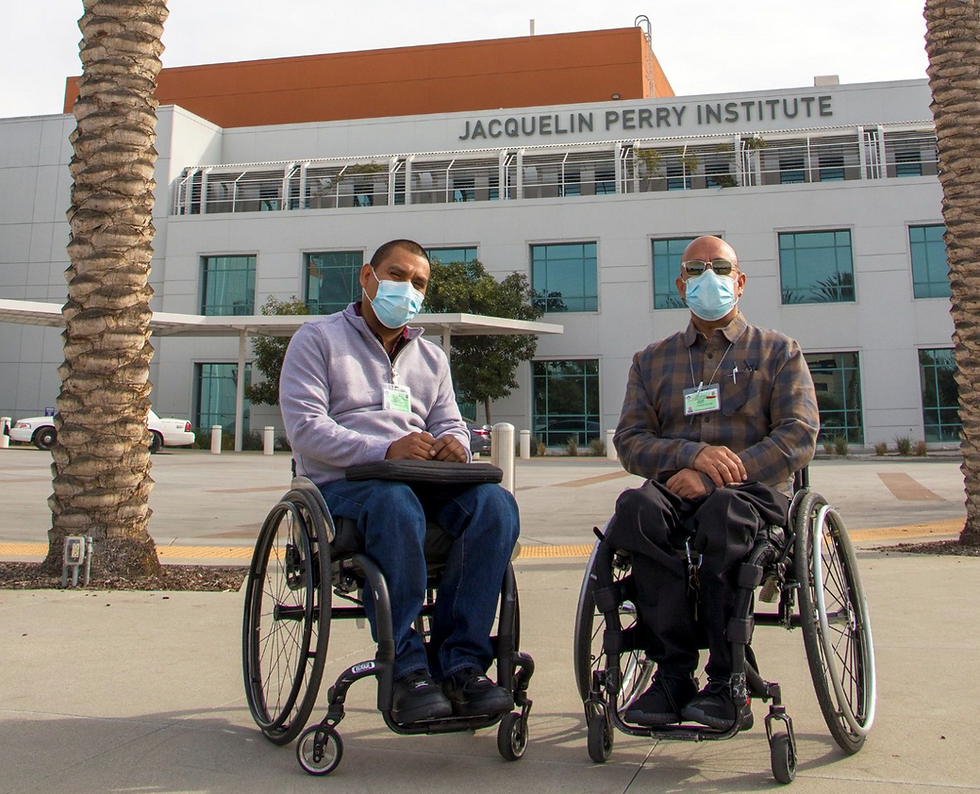Patients who sustain a disabling injury due to violence are often admitted into one of the trauma unit hospitals and later receive inpatient and outpatient rehabilitation services at Rancho. This includes individuals with spinal cord injury (SCI) and traumatic brain injury (TBI).
Following a devastating life change, adjustment to a disability and reintegration into the community are serious challenges these individuals face. Those who sustain a disabling injury due to violence are often marginalized and lack the extensive mental, emotional, social, and case management support they need. Victims of violence often return to a life of violence because they have no other choice.
During these challenging times, the Rancho Research Institute (RRI) launched the Rancho Violence Recovery and Prevention Program (RVRPP) in partnership with the Lynwood-based nonprofit Southern California Crossroads. Funded by the California Community Foundation and modeled after similar hospital-based programs, this initiative helps survivors recover from violent injury and reintegrate into their communities. Program staff are developing new interventions and ways to track each participant’s rehabilitation progress during their recovery.
The RVRPP also connects recent violence survivors among Rancho patients with peer counselors, social workers, and case managers.The RVRPP team recognizes that for violence survivors, adjustment to disability and community reintegration are difficult challenges.
"Our program is designed to offer strategies for those who are feeling lost, with little sense of direction."
The issue of violence that plagues our city and country needs to be addressed through a multi-faceted approach involving partnerships in both health care settings and the broader community.
"Our patients who have experienced violence will be affected for the rest of their lives. We are tired of seeing patients being 'treated and streeted'—they come here, we treat them, and we send them back to dangerous environments. Often, they return with re-admissions or suffer other forms of violence and psychological issues that were never addressed."
The RVRPP started out of the need to address violence for our patients. It is a collaboration between physicians, therapists, social workers, community-based organizations, administration, and past and present patients with "lived experience," as well as other stakeholders who see the need to address violence in many forms.
"We want to create opportunities for patients who are victims of violence to reintegrate back into the community by empowering them to achieve their personalized goals through community education and individualized services. Our goal is to meet patients where they live, work, play, and pray."
Program participants partner with a peer counselor who understands the many challenges of recovery. The peer counselor serves as a confidant and coach throughout the process.
Participants also have access to a wide array of hospital- and community-based supports, including:
Assistance in accessing benefits
Complex case management
Support groups
Individual counseling
Food support
Housing and educational assistance
Job training
By removing service access barriers, the RVRPP team believes that participants will more successfully return to full, productive lives—free from violence.
A peer counselor at the RVRPP, Felipe Estrada, sustained a spinal cord injury from a gunshot during a carjacking incident in 1997. Before becoming a peer counselor, Felipe was a patient at Rancho, where he received guidance and encouragement that changed his life. With support from Rancho staff and the California Department of Rehabilitation, Felipe completed a bachelor’s degree in Rehabilitation Services and is currently pursuing a master’s degree in Rehabilitation Counseling.
When asked about his most impactful experience as a peer counselor, Felipe says:
"Seeing the transformation of patients—from being shy and timid about their injury to becoming more confident and taking steps toward greater hope and healing."
"As an individual with a disability myself, making the connection and knowing that I too was in a similar situation is very important. I can talk to them about health issues and share thoughts about things that happen to our bodies because of the injury. I can talk to them about where they stand and where they want to go with their lives. I can talk to them about things they cannot talk to family members about."
"One of the most common questions that patients ask is related to sexuality and dating—‘Can I still have a family after this?’"

"Another goal of the RVRPP program is to develop a sustainable model by expanding our partnerships with all DHS facilities and community organizations."
As part of this, the program is developing a database registry to gather important demographic and follow-up survey data to track participants' progress as they reintegrate into their communities.
For more information about RVRPP, contact (562) 385-6069 or juang@ranchoresearch.org.

Comments